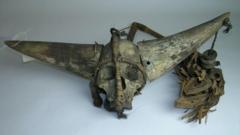The Naga people of India have expressed their outrage over the auction of ancestral human remains in the UK, provoking discourse on colonial legacies and the treatment of indigenous cultures. A recent incident involved a 19th-century skull from the state of Nagaland, discovered by Ellen Konyak, a member of the Naga Forum for Reconciliation (NFR), at an auction house in the UK. Konyak described the sale as deeply upsetting, highlighting the insensitivity of auctioning ancestral remains today.
The auction house, known as The Swan at Tetsworth, had listed the skull alongside various other artifacts, including shrunken heads from South America and skulls from West Africa. The backlash was prompt, with Naga scholars and the state's chief minister condemning the auction as an act of "continued colonial violence." Following widespread protests, the auction house withdrew the skull from being sold, but this incident reignited deep-rooted memories for the Naga people, fueling calls for the repatriation of remains and artifacts that reflect their cultural heritage.
Experts estimate that around 50,000 Naga items are held in UK museums and private collections, with Oxford University's Pitt Rivers Museum housing the largest collection, which includes 41 human remains. The growing ethical dilemma around the collection and exhibition of such artifacts has led some institutions to reconsider their practices. Scholars are advocating for the return of human remains, recognizing them as more than mere objects for display, but as vital elements of a living culture.
Anthropologist Arkotong Longkumer emphasizes the intricate nature of repatriating remains, which involves extensive research to verify their history and navigate legal processes. The NFR has established a group called Recover, Restore and Decolonise to facilitate this effort. They are actively engaging with communities and elders to build awareness and consensus about the spiritual implications of bringing ancestral remains back home.
The past of the Naga people is marred by violent colonial encounters, where significant cultural artifacts were lost or taken without consent. Konyak’s discovery of one particular skull belonging to a member of her tribe resonates deeply with her. While she acknowledges the logistical challenges in repatriating remains, she expresses a strong desire for respectful rituals to reclaim their heritage and history.
As movements for repatriation gain traction worldwide, the Naga community’s quest highlights the need for reconciliation with the colonial past and the importance of restoring dignity to indigenous cultures through the return of their sacred remains.





















